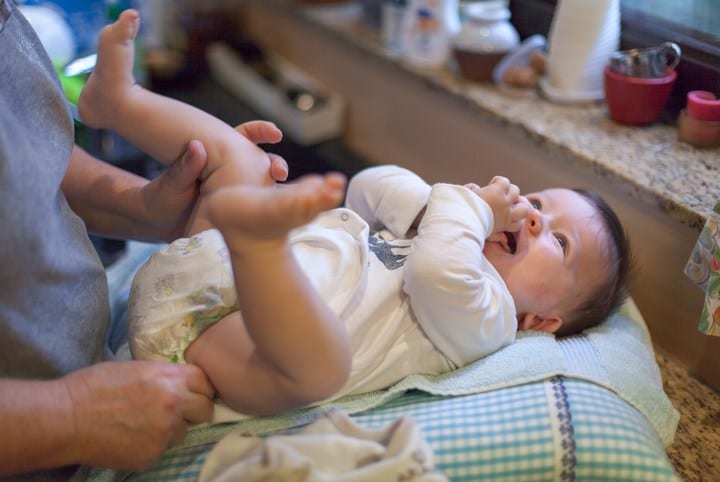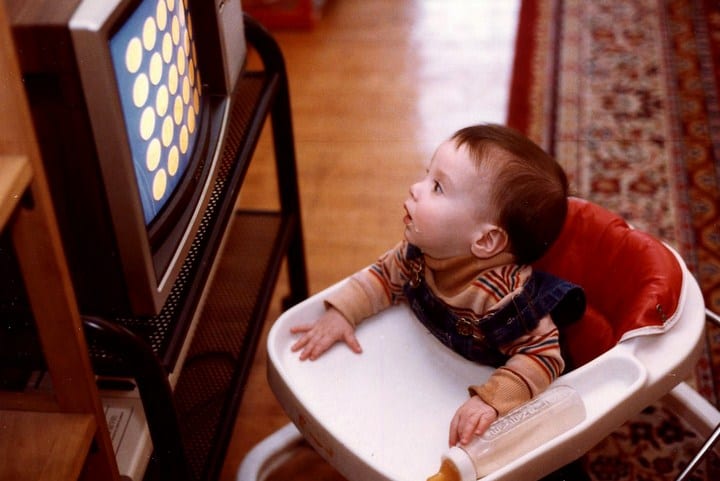Having a baby is a blessing, which sometimes can get challenging. Most of the time, during baby’s first year, parents lack sleep because of baby’s sleeping routine. We bring you 12 helpful tips that might help you with your baby’s sleep without you losing time and nerves.
Contents
- 1. A cozy swaddle aka „snug as a bug in a rug“
- 2. Dimmers as a help to distinguish between day and night
- 3. Warm bath as a nightly routine
- 4. Baby’s room temperature
- 5. White noise in the baby’s room
- 6. Tactful diaper changes
- 7. Avoid caffeine in case of breastfeeding
- 8. A bassinet or a co-sleeper
- 9. Limited screen time
- 10. Avoiding eye contact
- 11. Waking up for feeding
- 12. Finding what works for your baby
1. A cozy swaddle aka „snug as a bug in a rug“

From birth to 6 months old, babies suffer a startle reflex that gives them a free-falling feeling and causes sudden jerks and lifting arms, which might wake them up. Avoiding jerks can be done with keeping your baby in a tight swaddle.
2. Dimmers as a help to distinguish between day and night

Dimmers in the lamps and lights in your house can help you teach your baby when is the time for sleep. You can plan nightime schedule and regulate your baby’s circadian rhythm.
3. Warm bath as a nightly routine

Having a warm bath before sleep is great for everyone, and babies aren’t an exception. This could be a singnal for a baby that it is time for a snuggling into the bed.
4. Baby’s room temperature

The optimum temperature for a baby’s sleep ranges between 65 and 70 degrees Fahrenheit, as Dr. Alan Green’s book called From First Kicks To First Steps claims. If you keep the temperature a little low, by maybe putting on the fan at a low speed or keeping windows a little open, it will help your baby to fall asleep quicker.
5. White noise in the baby’s room
It is all about finding the right kind of noise that helps your baby sleep. Sometimes it is the sound of a vacuum cleaner, or sound of a fan at medium speed, or something third. You can even put a recording on loop, once you find the right noise.
6. Tactful diaper changes

You should change your baby’s diaper before their midnight meal, otherwise they might be fully awake and take longer to fall asleep again.
7. Avoid caffeine in case of breastfeeding
In case you are a caffeine addict, and breastfeeding, you will want to consider cutting your caffeine intake. Having extra chocolate, soda, or tea during the day, can affect your baby’s mood changes. Stick to 1 to 3 servings of caffeine, that would be just enough.
8. A bassinet or a co-sleeper

Having your baby sleep as close to you as possible is very preferable in the baby’s first 6 months of life. Using a bassinet or a a co-sleeper is a good idea, or you can sleep right next to your baby and take a quick naps with them.
9. Limited screen time

Make sure you keep your little Instagram star in the making away from screens for an hour or 2 before you put them to sleep. Letting baby play with touch screens will make it harder and longer to put them to sleep.
10. Avoiding eye contact

Babies use eye contact for communication and recognizing the people around them. It also releases oxytocin, the love hormone. So eye contact is good, unless you want to put your baby to sleep. Then it is bad. Avoiding eye contact will help your baby fall asleep quicker.
11. Waking up for feeding

Many believe that you should never wake up your baby while sleeping. But in case their sleeping is past the next feed time, it is wanted from you to wake the baby up. It actually helps your baby with the right sleep routine and them not being moody in the evening.
12. Finding what works for your baby

What works for your neighbour’s baby, might not work for yours. Babies give signals about what they like and don’t like, and it is up to you to catch the signal. Once you do, you go with it and it is a win-win situation for both you and your baby.
Make sure you share your tricks in the comments below.
Source: brightside.me
